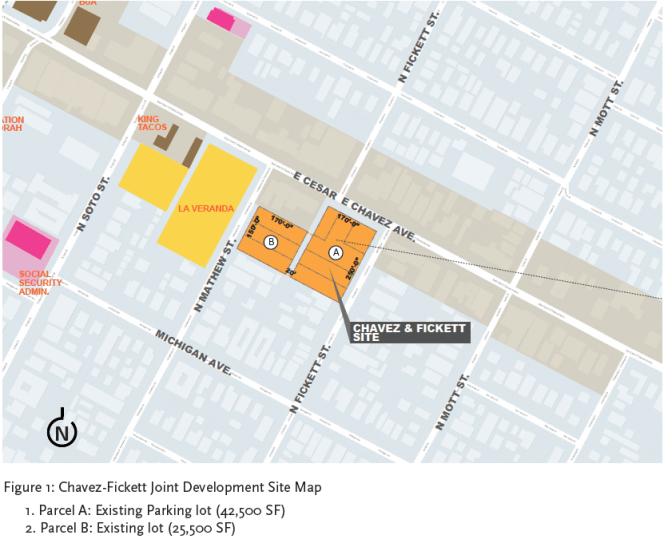Last Thursday, the Metro Board approved development guidelines for a pair of large, vacant Metro-owned lots at Cesar Chavez and Fickett.
The guidelines lay out community aspirations for the site and ask that a developer interested submitting a proposal for a project there be cognizant of the community's history and current conditions, that any retail (including the grocery store the community is asking for) be community-serving, that the project include publicly accessible green space, public art opportunities, and community-serving amenities, and that there be between 40 and 60 units of affordable housing for multi-generational families earning between 30 and 50 percent of the Area Median Income (AMI).
To give developers ways to play with those guidelines, four potential configurations were imagined for the lots.
Option 1 sees Lot B (see designations above) converted into open park space on the roof of a parking structure and Lot A transformed into a grocery store with housing above it and some parking behind it (below).
Option 2 envisions some park space available on Lot B, housing spread out over both lots, and some parking situated on the roof of the grocery store.
Option 3 consolidates all of the housing on the smaller lot, shrinking any potential park space, leaving the grocery store to stand alone with a large parking garage behind it.
Option 4 limits the size of the grocery market and available parking in favor of leaving Lot B fully open as ground-level park space.
One of the main reasons so many potential configurations are proposed is that parking is expensive to build and takes up a lot of space. The more parking residents want, the more trade-offs the project requires - more expensive housing units, less park space, or less space for a grocery store and community-serving retail.
The hope is that with the project site being located on a key bus corridor and within walking distance of a Gold Line station, there would be less need for parking. However, because it is sometimes easier to move across Boyle Heights via transit than to navigate your way to destinations within it, and because many of the lower-income residents within the community need at least one vehicle to get to off-peak and/or irregular jobs across town (or just meet the obligations of multi-generational families), scrapping parking altogether is almost never an option.
Either way, the project itself is long overdue.
Metro had used the lots as staging areas during the construction of the Gold Line over a decade ago. For too many years afterwards, the only improvement to those sites was the street furniture placed on the sidewalk adjacent to one of the lots by Union de Vecinos.
The reasons for the delay on the development of the site are not 100 percent clear, but the delay may have worked out in the community's favor. According to a 2015 staff report on plans for the lots, an unnamed developer had submitted an unsolicited proposal for market-rate housing for the Cesar Chavez/Fickett property (along with two others) to Metro back in 2004. That developer later decided to shift its focus from market-rate housing to affordable housing, and brought McCormack Baron Salazar (MBS) in to handle the affordable housing component. Not long after, it appears, the first developer abandoned their interest in the property altogether, essentially leaving it for MBS to develop. As the property was determined to be too small to support both housing and a supermarket, MBS proposed the kind of stand-alone supermarket the community had asked for (as a replacement for a market that was lost when the Gold Line was built).
In January of 2013, the Board authorized Metro staff to enter into an Exclusive Negotiations Agreement (ENA) with MBS for the supermarket project without ever having opened up the project to a competitive process, something Metro later seemed to regret. The authorized ENA was subsequently never executed. In detailing their reasons for rescinding the ENA, Metro noted that proposals where developers had access to additional land or could offer other “unique betterments” could make for a superior project to the one offered by MBS. Metro also cited the desire to put the project through a community-driven process. Finally, and perhaps most importantly, there was a technical reason Metro started the process over: the only way to have proceeded with MBS' project would have been to approve a sole-source development agreement, as the property is classified as “excess” property (no longer needed for transit purposes). Metro preferred to use a joint-development process for the property, which would allow Metro to pursue both a more community-driven and competitive process as well as one that would help ensure the resulting project was more community-serving.
The ENA was thus rescinded in 2015, returning the project to square one. The subsequent round of community engagement held last spring, and accomplished with the help of urban design/architecture firm of Gwynne Pugh Urban Studio (with the architectural team of Perkins + Will and DakeLuna, shaped the guidelines approved Thursday [see attachment B]. They will be sent out to developers as part of the Request for Proposals process next month.
For more on Metro's Joint Development Program, please visit their website, here.






